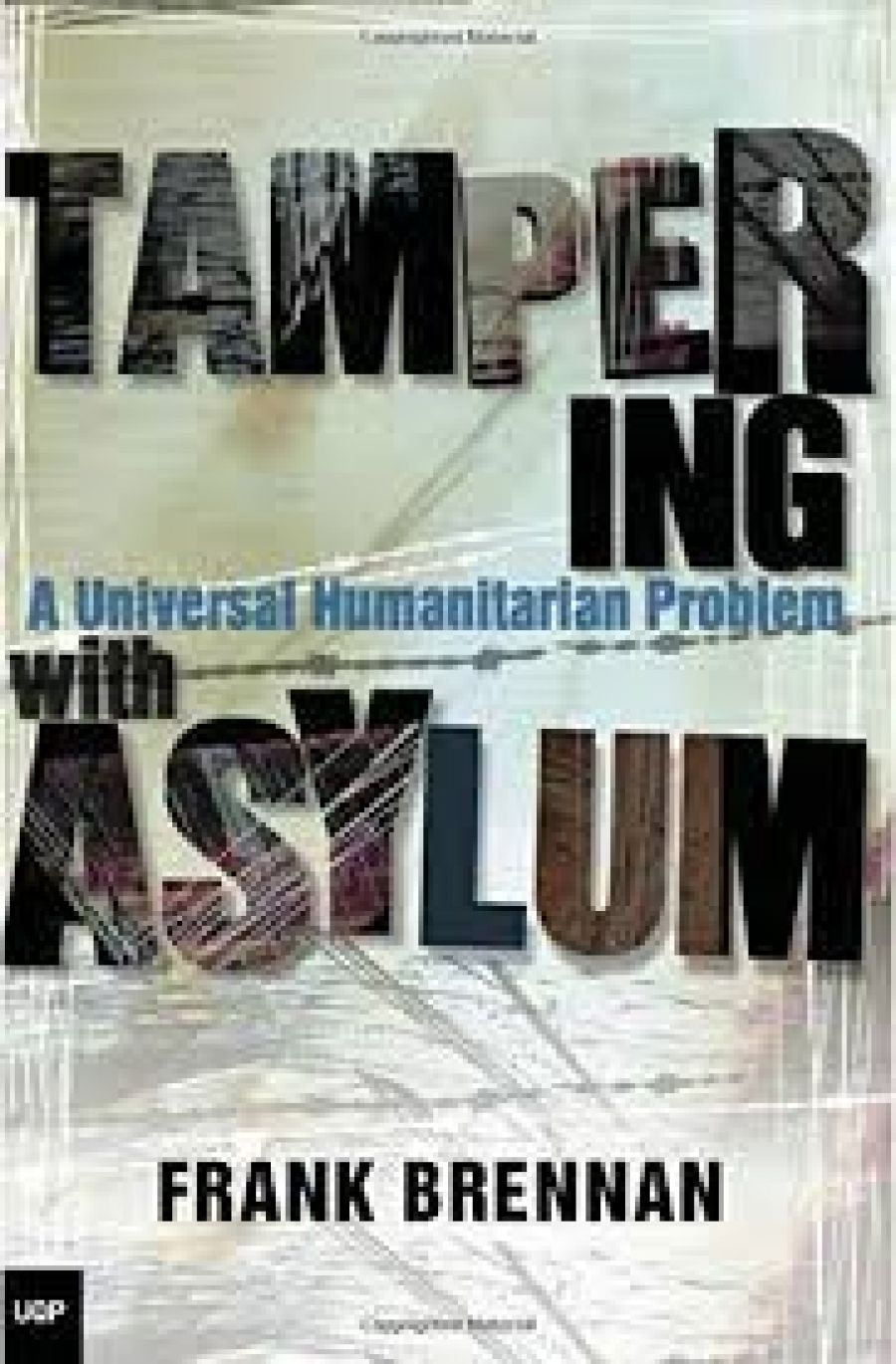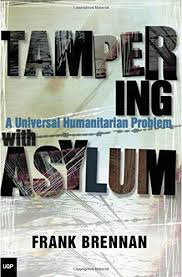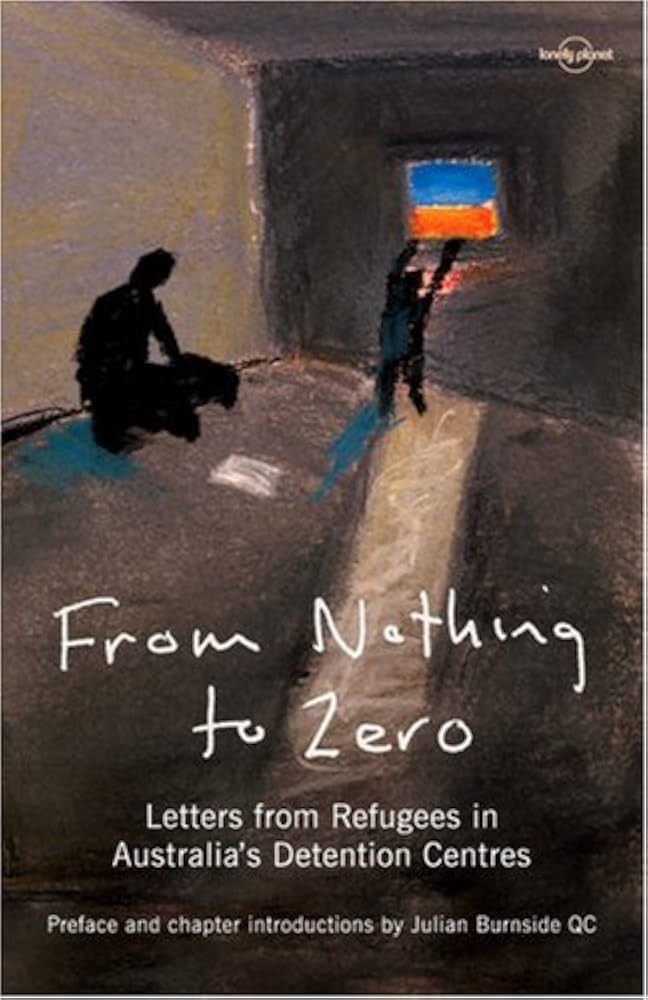
- Free Article: No
- Contents Category: Politics
- Review Article: Yes
- Online Only: No
- Custom Highlight Text:
It had to be the black metaphor of the season. On Boxing Day, Radio National ran a short, sharp-edged conversation on Australia’s changing relations with the Pacific island-states. One contributor, Professor William Maley, said that the Australian government’s bribery of the destitute statelet of Nauru made him think of ‘the caddish squire seeking out the most wretched prostitute in the village’. Responding. Richard Ackland commented that those who devised the appalling Pacific Solution seemed extraordinarily unconscious of the connotations that still attend that word ‘solution’.
- Book 1 Title: Tampering with Asylum
- Book 1 Subtitle: A universal humanitarian problem
- Book 1 Biblio: UQP, $30pb, 234pp
- Book 1 Cover Small (400 x 600):

- Book 1 Cover (800 x 1200):

- Book 2 Title: From Nothing to Zero
- Book 2 Subtitle: Letters from refugees in Australia's detention centres
- Book 2 Biblio: Lonely Planet, $22 pb, 193 pp
- Book 2 Cover Small (400 x 600):

- Book 2 Cover (800 x 1200):

- Book 3 Title: Desert Sorrow
- Book 3 Subtitle: Asylum seekers at Woomera
- Book 3 Biblio: Wakefield Press, $24.95 pb, 205 pp
- Book 3 Cover Small (400 x 600):

- Book 3 Cover (800 x 1200):

In the prison on Nauru, a hunger strike was maintained through the Christmas period. Amanda Vanstone, the present responsible minister, recites the script made familiar by her predecessor Philip Ruddock: these people are failed asylum seekers who are refusing to return to their countries of origin, though we deem those countries to be safe. They believe that by acting in this way they may change the Australian government’s decisions as to their status, but the government will not be thus intimidated.
There are 284 people detained on Nauru, ninety-one of them children. Frank Brennan argues that their claims for refugee status might have been more fairly judged onshore – or in New Zealand, where 131 of their desperate travelling companions from the Tampa found a secure haven. Julian Burnside, introducing letters from detainees in Nauru in From Nothing to Zero, notes that the Pacific Solution was devised ‘just when it seemed that the Howard government’s human rights record could sink no lower’.
Excluding Nauru, there are, as I write, 1100 people in Australian detention centres; about 350 of them have been there for more than two years. To reach Australia, they have undergone enormous hardship and danger. Many are very young men. bewildered by the incomprehensibly harsh prison regimes in which they find themselves, and weighed down by their knowledge of debt and obligation. They wait to have their claims determined, or else to be returned to their countries of origin and to living conditions that they dread. Their families struggled to find the money for the smugglers; sometimes whole communities contributed; how can they go back, with nothing gained?
The Lonely Planet book, a brave and sobering intervention, maps a landscape of extreme anxiety and despair. It does not give individual stories, but extracts from letters structured around memories of home countries, journeys, waiting, boredom, disappointment and the struggle against despair – or, at best, the anomalous, ambiguous relief of a Temporary Protection Visa (TPV). A young man writes: ‘My hope to make life in your country really is finished ... I don’t know what will happen to me in Iran but I know death in my land is much better than dieing in this detention or this hell.’
Tom Mann’s heartfelt memoir, from periods he spent teaching maths and English at Woomera, adds to the weight of evidence. When Woomera closed, some of his pupils and teaching assistants were released on TPVs, others removed to relentless panoptical surveillance inside the four-metre electric fence at Baxter, from which they can’t look outwards, even on to desert.
Any suggestion of continuity with fascism is condemned as so much bleeding-heart melodrama. No one is being starved, gassed or subjected to forced labour; but visitors and correspondents are shadowed by a sense of terrible repetition. Proto-fascist forms of control and surveillance are in place, in prisons run for profit by dubiously trained personnel: prisons in which the inmates are held without charge indefinitely, and refused information on their fates.
Frank Brennan has investigated the protocols of asylum elaborated in international human rights treaties and conventions back to the UN Refugee Convention of 1951, and he finds the seeds of present policies in the White Australia Policy. and Australia’s claims to special status, expressed in debates more than half a century ago. When UN delegates were drafting the Universal Declaration of Human Rights of 1948. and later the International Covenant on Civil and Political Rights (ICCPR), Australia was among the countries that opposed any guarantee of the right to asylum. Those voices prevailed; while people fleeing persecution have the right to seek asylum, no country is obliged to grant it.
This, however, is the only country that insists on a nexus between the offshore quota (12,000, down from the 20,000 ten years ago) and the numbers granted visas onshore – that is, the asylum seekers who have arrived without visas and now seek refugee status. The government can talk about ‘queue-jumping’ only because it chooses to determine that any asylum seeker granted even a temporary visa must perforce displace a refugee admitted through the offshore programme. But as Brennan comments, ‘this moral calculus is entirely of the government’s construction’.
Brennan contrasts our practices with those of the UK, US and Germany, the countries that receive the greatest number of applications for asylum each year (92,000 was a recent annual figure for the UK). In each, he finds that border control policy and migration law are draconian: ‘It is now virtually impossible for a refugee lawfully and honestly to flee into a first-world country seeking asylum.’ The European Union’s provisions for support are pathetic: ‘many asylum seekers throughout Europe will ... eke out a miserable existence ... while they await the determination of their claims.’ They’ll be out of detention, but still leading very hard lives in remote hostels. With all that, Brennan judges that the European system, grudging as it is, ‘is still preferable to detention in Woomera or Baxter or on Nauru’.
His book is stringently policy-focused and unemotional. He concedes the government’s concern for border protection, and understands post-September 11 insecurities; he doesn’t underrate the problems of dealing with 13,000 asylum applications a year. He reviews few individual stories, though those he includes are unforgettable. He contests the unreasonable conditions of TPVs; once accepted as a refugee, the asylum seeker should be allowed residency and the right to family reunion.
Crucially, Brennan wants the linkage broken between on- and offshore applications, and an end to continuing detention while applications and appeals to the courts are in process. No other country does this. Australia is in breach of the Refugee Convention, the ICCPR, the conventions on the rights of children and against racial discrimination; and in certain cases of forced return to unsafe countries, the convention against torture.
Mr Ruddock Goes to Geneva appears in the excellent new Briefings series from the Institute for Social Research at Swinburne University with UNSW Press. It is a short but extremely important manual on Australia’s present relations with the UN and with international human rights law. Spencer Zifcak recalls the drama in the Palais des Nations in March 2001, when Philip Ruddock presented the Committee on the Elimination of Racial Discrimination (CERD) with what he clearly believed to be a record of excellent performance. He was grilled unmercifully by a highly informed CERD rapporteur who had done her homework on Aboriginal living conditions, and also on asylum seekers and mandatory detention.
The Australian government was highly affronted, and launched its open attack on the UN. Soberly, Zifcak weighs the issues; he confirms that the organisation and its committees need reform, which must come from within the UN itself, with the help of member states. He acknowledges what’s good in the general national record, but also shows clearly why Australia has been criticised by all six human rights treaty committees.
He goes further, looking at the future. He sees a deliberate ‘strategic shift [i.e., by Australia] from the UN to the US, from Asia to the West and from multilateralism to unilateralism’. This shift, made for short-term electoral gain, threatens great long-term damage in this country, while it also endorses a dangerously unipolar world under US control.
He sees the Iraq war as signalling ‘the destruction of the authority of international law’, which came into being with the UN Charter in 1945. The Charter, and all that followed from it, were responses by the international community of the mid-century to six years of mass destruction: attempts to institute legal barriers to any return of totalitarianism and fascism. Writing in the framework of that genealogy, Zifcak reminds us of the connections; with all the warfare since, all the UN’s failures and flaws, we can’t return to a world gripped by contending national sovereignties, each one arrogantly a law unto itself.
The big picture, and the smaller ones from behind the razor wire, should be viewed together. Following on from Peter Mares’s Borderline (2002) and Heather Tyler’s courageous Asylum (2003), all four of these books are necessary reading. They show that we have an unlivable regime. Howard, Ruddock and others concerned, on both sides of politics, claim to be Christians. As an ex-Christian, in a secular society pervaded by Christian ethics, I keep remembering one Gospel edict: when a hungry person comes asking for bread, you do not give him a stone.


Comments powered by CComment